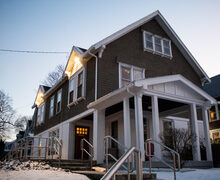University Hill neighborhood to see new bike lanes, improved sidewalks
Molly Gibbs | Photo Editor
The project also aims to improve pedestrian safety and reduce traffic.
The University Hill neighborhood will see the construction of five new bike lanes over the next few months.
Construction of the University Hill Bike Network Implementation Project, a plan to restore roads and sidewalks on streets around the University Hill neighborhood, began last week. Stretches of Comstock, Waverly and South Crouse Avenues will be modified with bike lanes, repaved roads and revamped sidewalks.
Mary Robison, city engineer, said the project is anticipated to be completed in late July. Two-way traffic on the roads will continue during construction, and work is being coordinated around major events at Syracuse University, such as commencement, she said.
“In the short term, it’ll probably be a little bit of an inconvenience, but in the long-term you’ll have a nice newly-paved roadway with more dedicated bike lanes,” she said.
Bike lanes were added to Euclid Avenue in summer 2018 after community outcry for several years. A band named Bike Lanes on Euclidrecently played at SUNY-ESF.
The three streets involved in the project were chosen in 2013 because of the high number of students that use them, said Mirza Malkoc, a facilities engineer.

Anna Henderson | Digital Design Editor
The project primarily involves milling and paving the roads, restoring sections that are in poor condition and adding new five-foot-wide bike lanes to both sides of the road. Sidewalk corners will receive curb ramps and warning strips to reach compliance with the Americans with Disabilities Act. Pedestrian crossing signals will also be installed in areas that don’t currently have them, Robinson said.
City engineers will also work to optimize traffic signals on the three streets to improve traffic flow, Robison said. Several gas mains and water valves in the area will also be replaced to reduce the potential for breaks in the future, Malkoc said.
Watson Hall lost drinking water for several days in February after a water main broke three times on Waverly Avenue.
The project is funded by local, state and federal sources. The city’s share of the funding is about five percent, state funding is roughly 15% and federal funding is 80%, Robison said.
The Syracuse Metropolitan Transportation Council approved the project in 2008.It was planned after the council conducted case studies of Ithaca and Madison, Wisconsin. The studies found the two cities experienced increased rates of bicycling and walking after these cities improved their bicycling and pedestrian passageways.
Similar construction work in University Hill would benefit residents because of the many bicyclists and pedestrians in the area, the council’s report found.
Malkoc said the 11-year gap in the project’s execution resulted from funding and scheduling delays. City engineers did not receive funding for the preliminary design of the bike network until roughly 2015, he said. Funding for the construction design was not allocated until the fall of 2018, and the contractor decided to wait until the spring to start the project, Malkoc said.
At first, the project was mainly concerned with the safety of bicyclists in the area, but the project grew in scale from there, he said.
Published on April 16, 2019 at 10:13 pm
Contact Gillian: gifollet@syr.edu





